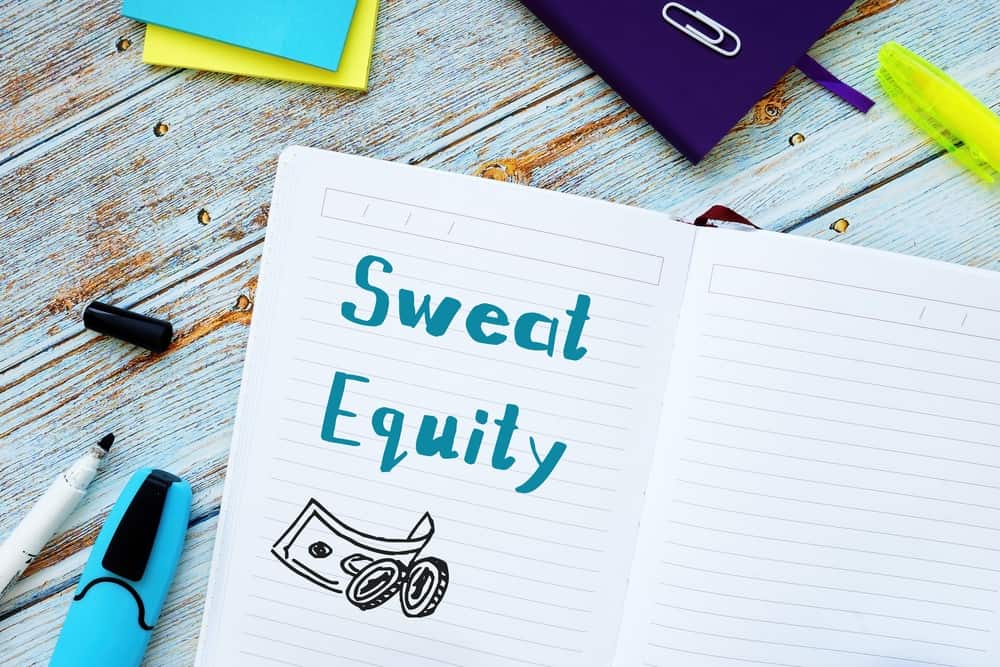Sweat equity is the subjective measure of an individual’s hard work, or perhaps lack thereof. On the surface, it is an arbitrary label used to identify how much work someone has put into a particular project. Beneath the surface, however, it is an important measure of someone’s work ethic, and ultimately an indicator of their commitment to a respective project or goal. Thanks to a little hard work, investors can gain better insight into how much their time is worth, which is invaluable for anyone looking to maximize profits and minimize losses. That said, it’s not enough to simply know what sweat equity is; investors need to know how to use it to their advantage.
What Is Sweat Equity?
Sweat equity is a term used to describe when a person contributes their time, labor, and effort to a project. Despite its name, sweat equity is a non-monetary exchange used to value one’s contributions to a particular goal.
It has become commonplace to see new entrepreneurs or startup businesses save money by working on projects themselves. Capital can be scarce when starting out, so many entrepreneurs resort to rolling up their sleeves. In return for doing the job themselves, entrepreneurs can often save money.
However, it needs to be noted that while hard work and labor are capable of saving entrepreneurs money upfront, it often results in more time being spent on each project. Therefore, entrepreneurs will need to weigh what is more important for their particular situation. It is entirely possible for physical labor to have a negative impact. In the real estate industry, in particular, delays onset by labor can simultaneously increase holding costs and risks.
[ Thinking about investing in real estate? Register to attend a FREE online real estate class and learn how to get started investing in real estate. ]

How Does Sweat Equity Work?
Regardless of the industry, sweat equity refers to the act of building equity in an asset with physical labor, mental fortitude and time. Whereas equity is traditionally built by capital appreciation, sweat equity builds equitable positions through physical work.
In real estate, sweat equity often takes on a more literal meaning. Real estate investors and homeowners will make repairs or upgrades through their own physical labor. For homeowners, it may lower the cost of homeownership or increase property value. For real estate investors, sweat equity often refers to the act of carrying out renovations without the help of a contractor and improving margins at the time of a sale.
Sweat Equity For Real Estate Investors
There are plenty of opportunities to trade sweat for more equity in a real estate asset. Entrepreneurs who are short on savings and looking to break into the investing business can exchange their skills and labor for a larger equitable interest in the property. Those with skills in construction, landscaping, painting, plumbing, or electrical may trade their expertise in a particular industry for more equity in the home. Instead of simply hiring someone to do the job, entrepreneurs may improve the value of the home on their own; they are quite literally trading sweat for equity.
To be clear, real estate investors should only consider using their own hands when they are sure their skills are capable of getting the job done well and efficiently. Time is money, and inexperienced labor can extend the time in which it takes to complete a project. Therefore, entrepreneurs should only invest their own time into a project when they are certain it is worth it. Otherwise, it may be more beneficial to pay someone else to do the job if they can get it done faster.
If you are certain your labor is up to par, find an investor interested in putting up the capital for a deal. There are numerous parties interested in real estate, but not the day-to-day operations or work involved in a property. Network in your community, among your friends, and online through specific groups to find potential investors to work with. Then take time to get to know your potential business partner before you begin working together.
From there, it’s crucial to create an agreement between you and the other investors. The agreement needs to clearly define the value of the investment vs. the value of the labor involved. This will help you both be satisfied with the different contributions of the investment, and protect either party should anything go wrong. Another option is to consult with a real estate attorney to formalize your agreement.
Sweat Equity For Your Real Estate Business
Entrepreneurs may also use time to expand their real estate business. For instance, real estate investors can purchase an investment property and do all the repairs and renovations themselves; they might even recruit the help of friends and family members.
As capital is accumulated over several projects, the money can be used to expand the business gradually. More employees and efficient systems resulting from the investment of capital can take businesses to an entirely new level.
Labor may also help entrepreneurs expand their own skill sets. There’s no reason a new investor couldn’t develop expertise in a new profession or skill. For example, forward-thinking investors may benefit from becoming experts on energy-efficient smart homes. Having a unique skill set will put them in a great position to succeed in the future without relying on anyone else.

Example Of Sweat Equity
Let’s say that your friend wants to invest $25,000 into your latest fix-and-flip project for a 20 percent stake. The valuation of the deal is $125,000 ($25,000 / 20% = $125,000). Your friend’s stake is $25,000, so your stake is $100,000. If you don’t invest any cash into the project, the sweat equity equals your stake, or $100,000. However, let’s say that you planned to invest $50,000. In this case, the value of your labor is the remaining $50,000. ($100,000 – $50,000 = $50,000).
Another example may help better illustrate the point. Consider a new business that is split between three partners. Each partner contributes a set amount of time to create the business plan, marketing strategy, and other startup materials. The business partners need to come up with an agreement on how to split future revenue, and how to divide the income if they sell the company in the future. In this example, each share of the business is worth $8, and the partners put in equal work amounting to $24,000 when establishing the business. Based on this, we would take ($24,000 / 8) and see that each founding partner has 3,000 shares of sweat equity.
How To Calculate Sweat Equity
Sweat equity does not provide an accurate financial portrayal of an entrepreneur’s monetary commitment to their business. Instead, it represents the amount of time spent developing the business. Consequently, sweat equity is measured by how much value is added to a business as a result of that sweat equity; it is easiest to explain this in terms of how much equity an investor is willing to put in for a share of the profit.
To calculate sweat equity, entrepreneurs must first calculate the value of the business. Next, they must determine the value of each share of their company (private companies without shares will need to resort to using percentages of the company instead). Finally, entrepreneurs will need to calculate the value of the labor itself. In other words, what would they have earned if he or she had done the exact same work for another company?
With all of the variables accounted for, take an investor’s investment amount and divide it by the percentage of equity it represents. Then, subtract the investor’s investment, and the remaining number expresses the dollar value of your sweat equity in the business venture.
Summary
Another great way to think about sweat equity is the time value of your money. Of course, you can spend hours sweating it out on that kitchen renovation to save on your overhead, but could your time be better spent elsewhere? Could you generate more profit by hiring a skilled contractor? Could you be using your time to find buyers or close your next deal?
Hard work is a great way to help build up your business with your own hands. Once you accumulate some capital, however, it’s a great idea to take a look at the big picture and evaluate how your time could be used effectively.
Ready to start taking advantage of the current opportunities in the real estate market?
Click the banner below to take a 90-minute online training class and get started learning how to invest in today’s real estate market!



